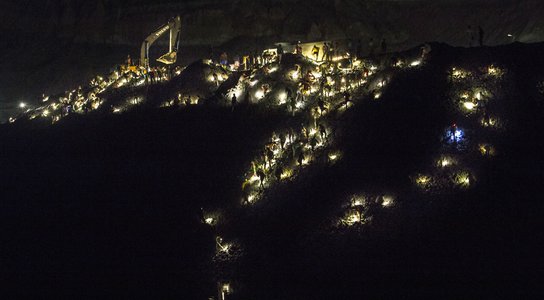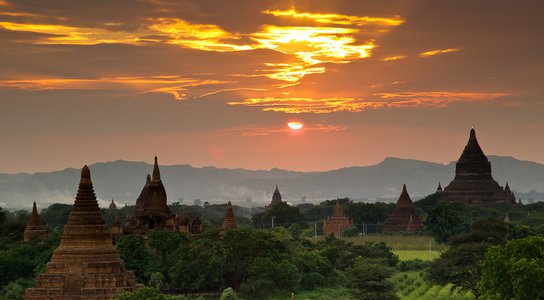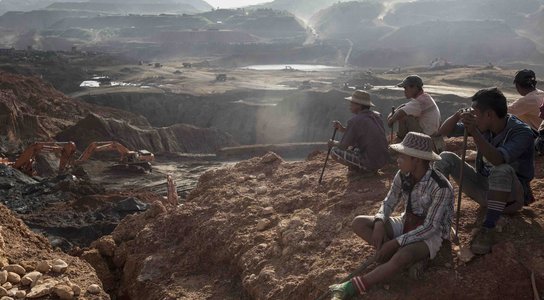Civil society calls for “21st Century Panglong” conference to prioritise a new approach to natural resources as part of peace-building efforts
Myanmar’s massive jade business is helping to drive deadly armed conflict and threatens the peace efforts that Daw Aung Sang Suu Kyi has made her government’s top priority, a new film from NGO Global Witness shows today.
As the country prepares for a landmark national peace conference on 24 May, Jade and the Generals shows how a fair peace deal could see powerful army families and companies losing out on vast profits from jade. Kachin State in the north is home to mines which produced jade worth up to $31billion in 2014 - it is also the site of some of the worst fighting. The film includes powerful testimony from refugees and local leaders calling for an end to the fighting and reform of the trade that is driving it.
“100,000 people have now been driven from their homes by airstrikes, shelling and other military offenses in Kachin State. This is the latest injustice to be inflicted on a population which has seen its environment destroyed and its most prized assets stolen by those who control the jade trade,” said Paul Donowitz, Global Witness’ Campaign Leader. “Local people are increasingly desperately calling for peace. To deliver it, the government must remove the incentives to keep fighting. Kachin’s jade riches need to be managed in the interests of its people, not men with guns.”
The film launch coincides with a call from influential Kachin and transparency and natural resource-focused civil society groups for the forthcoming peace talks to focus on fair, transparent and accountable management of natural resources in order to forge lasting peace. The signatories are calling for issues including allocation of resources, environmental and social safeguards and the fair sharing of benefits to be high on the agenda.
“Most of the jade companies are connected to the army. It is very obvious that the army is protecting the jade business and trying to control the land,“ said Reverend Samson, the General Secretary of the Kachin Baptist Convention, in an interview in the film.
Global Witness has previously shown how the families of notorious military figures including former dictator Than Shwe and ruling party bigwigs and former ministers Ohn Myint and Maung Maung Thein are major players in the jade industry. Both army units and the ethnic armed groups which oppose them take huge revenues from taxation and extortion. Meanwhile, local communities suffer the social and environmental cost of jade mining, feeding distrust and resistance of the central government and making peace more difficult to achieve.
In July 2016 reformers in the new civilian-led government implemented a suspension of jade licensing.
“This licensing freeze allows space for an overhaul of the industry, and the government should maintain the suspension until the sector can be reformed,” stated Paul Donowitz. “With the right measures in place, reformers in government can ensure Kachin’s jade trade is on a path towards finally delivering benefits to local people and much needed funds to the government, whilst protecting this precious environment. If the ban is lifted too early, this opportunity will be lost.”
The peace talks must also urgently focus on the role jade plays in incentivizing and fueling conflict.
“Myanmar’s government has promised that its first priority is to end the ethnic armed conflicts,” said Donowitz. “If it is to succeed, it is crucial that both sides agree on a new approach to the country’s most valuable natural resources. That means getting the men with guns out of the jade trade, and taking concrete efforts to stop natural resources being used to consolidate the military’s grip on power.”
/ ENDS
Contacts
-
Juman Kubba
Notes to editor:
- The Global Witness film ‘Jade and the Generals’, the photographic story ‘Cursed Treasure’ and the joint civil society statement are available at https://www.globalwitness.org/en/campaigns/myanmar/. All materials are available in English and Myanmar language.
- Further information on the workings and control structures of Myanmar’s secretive jade industry are laid out in Global Witness’ report, ‘Jade: Myanmar’s “Big State Secret”’ which is available at https://www.globalwitness.org/en/campaigns/oil-gas-and-mining/myanmarjade/. This includes details of the interests of the Than Shwe, Ohn Myint and Maung Maung Thein families in the multi-billion dollar sector.
You might also like
-
Report Jade: Myanmar's "Big State Secret"
As Myanmar's historic election approaches, our report reveals a secret jade trade worth up to US$31 billion, and controlled by military elites and drug lords.
-
Campaign Myanmar
Myanmar is so closely identified with natural resources such as jade, rubies and teak that its name is a brand in itself. But so far its people have not benefited from the brand.
-
Extended Report Cursed Treasure
A photographic journey into Myanmar’s famed jade mines and the links to the military and ethnic armed conflict which has engulfed the country for decades.